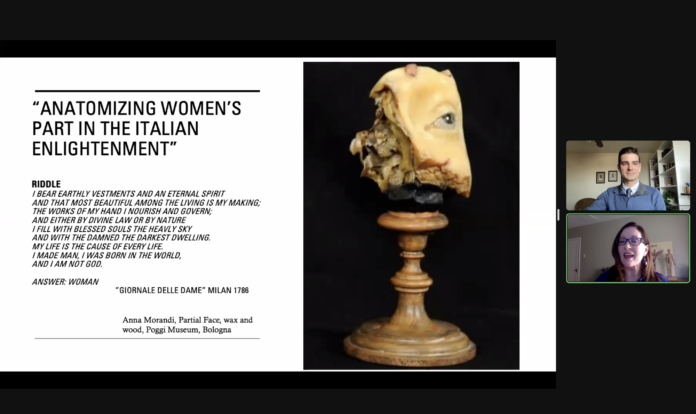
By Clara Snyder | Staff Writer
The president of the American Society for 18th Century Studies, Dr. Rebecca Messbarger, was brought to Baylor virtually by the history department on March 1 to speak about Women’s History Month.
The first day of March marks the beginning of Women’s History Month, and assistant professor of history Dr. Daniel Watkins said this month is one of many things the university intentionally recognizes and participates in.
“It has been a significant part of what the history department tries to do in drawing attention to the history of lots of different people throughout the course of world history and making sure that all stories are told,” Watkins said.
Messbarger said her lecture focused on the Age of Enlightenment in 18th century Italy with respect to women. According to Messbarger, this specific century is when many simple aspects of society, such as coffee culture, came to be. Messbarger began the lecture by elaborating on a horrific event in which a woman executed for infanticide was dissected in front of a crowd at the anatomical theater at the University of Bologna.
“The dissection of her corpse at the university’s annual public anatomy epitomized the old order in its enforcement of the infanticide punishment beyond death, through the exposure of her naked and eviscerated cadaver on the dissection table on that frigid January day,” Messbarger said.
Messbarger said that the same anatomical theater welcomed Laura Bassi, the first woman to have a doctorate in science and the second woman to earn a doctorate in philosophy, to lecture on Newtonian physics 24 years later. According to Messbarger, the contrasting of these two events marks a shift in women’s status of authority in the public sphere.
“Instead of a woman being executed and opened up in front of a crowd, you have a woman who’s lecturing,” Messbarger said. “There was an opening in Italy to allow women to have positions of authority unlike anywhere else in Europe.”
Messbarger said the article that drove her toward this specific area of research was one she read at the University of Chicago pertaining to women’s authority in the 18th century. She said the information grabbed her and ultimately led to the granting of a Fulbright for research in Rome and Italy; her research centers around the Age of Enlightenment during 18th century Italy.
“The Italian Enlightenment matters,” Messbarger said. “It’s skipped often, but it was a very important place of Enlightenment reform, and that reform was tied to the public authority of women.”
Messbarger described Italy at the beginning of the 18th century as a backwater. According to Messbarger, the biggest promoter of learned women was the pope; she said the pope was forward-looking, as he was concerned with the rehabilitation of Italy’s reputation.
“At the beginning of the 18th century, there was a desire on part of intellectual and civic leaders to reestablish Italy as a place of learning and a place of innovation,” Messbarger said. “One of the ways a number of leaders thought to showcase how modern Italy was was by promoting learned women.”
Messbarger said she hopes the audience left with the understanding of the space in society that was made for women. According to Messbarger, the space made by people in power for women’s ambitions is one of the main factors that allowed this expression to occur.
“Women’s ambition, which is marvelous and important for the advancement of society, must be supported by civic structures,” Messbarger said. “Leadership matters.”
Watkins said during the Enlightenment, there were several women doing the exact same things as male figures. He said this makes studying the time period in relation to women’s history that much more important.
“The reality is there are so many women that are also doing the exact same thing [as male figures],” Watkins said. “So it’s important [for women’s history] to study the Enlightenment, because what you see in that is the role and impact of intellectual women in past societies.”
According to Watkins, the goal of sponsoring events such as this is to expose the Baylor community to as much useful and cutting-edge knowledge as possible. Watkins said he encourages students to seek out information on the women and gender studies program, as there are many professors specializing in women’s history who teach courses on the matter.





